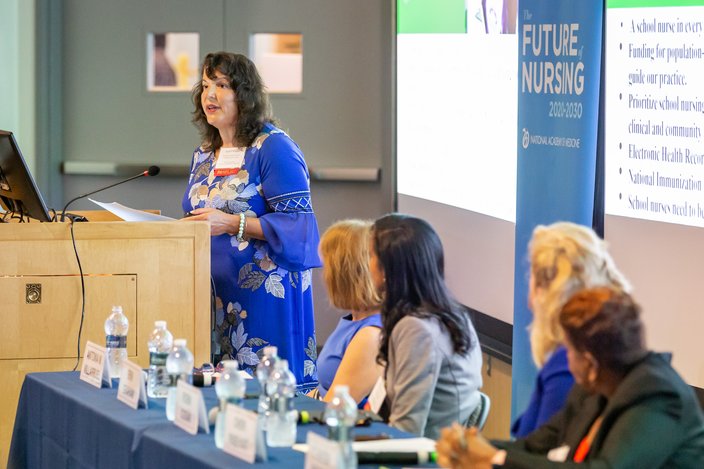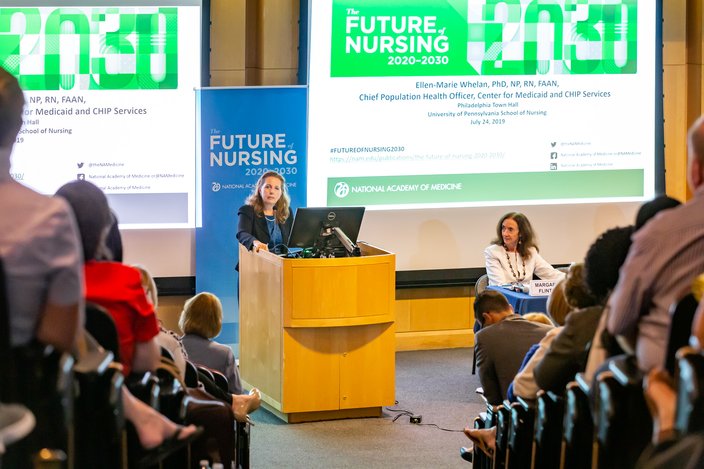
July 24, 2019
 Thom Carroll/PhillyVoice
Thom Carroll/PhillyVoice
Several hundred people attended a nursing forum hosted by The National Academies of Sciences, Engineering and Medicine at the University of Pennsylvania, Wednesday, July 24, 2019. The forum examined strategies for caring for patients with complex health and social needs – and the payment challenges associated with that care.
Robin Cogan recently had a message from a man she treated as a nurse some 15 years ago in the Camden City School District. The former student – whom she had not seen since he was a young boy – told Cogan that she was his hero.
As a fourth-grader, the man had sat in Cogan's office during a particularly troublesome time in his life. Her kind words saved him from taking his own life, his letter said.
"I cannot imagine what would have happened if there had not been a school nurse there that day," said Cogan, the legislative chair for the New Jersey State School Nurses Association.
Cogan shared the story on Wednesday as part of a nursing town hall meeting in Philadelphia hosted by the National Academies of Sciences, Engineering and Medicine. The organization has tasked a committee of health care professionals with producing a report outlining the best path toward creating a culture of health in the United States, reducing health disparities and improving health and well-being by 2030.
The forum, held at the University of Pennsylvania School of Nursing, marked the second of three town halls being held across the country. Each town hall has a different focus. The latest centered on caring for people with complex health and social needs – and the necessary payment methods.
The event, which brought out several hundred people and more streaming the conversation online, featured a pair of panel discussions that included nurses serving students, geriatric patients and pregnant women, as well as medical professionals now in administrative roles.
Cogan said it takes tenacity to care for students with complex health care needs. She said 37 percent of Camden families live under the poverty line and their life expectancy is 10 years less than in the nearby suburbs.
She sees students impacted by gun violence, the opioid epidemic, racism barriers, homelessness – all of which take a toll on their health and wellbeing. Additionally, many students have chronic health conditions, like asthma and diabetes, that can be fatal if not treated properly.
"We function in a hidden health care system that has been widely misunderstood," Cogan said. "Being relentless is our only choice."
Cogan has worked to amplify the voices of school nurses by writing a weekly blog dubbed "The Relentless School Nurse." A Johnson & Johnson School Health Leadership Fellow, she is a faculty member at Rutgers University-Camden's School of Nursing.
School nurses detect illness early, prevent its spread and identify students at risk, Cogan said. They are responsible for preschool students as young as three and high school students in their late teens.
Yet, fewer than 40 percent of U.S. schools employ a full-time nurse, Cogan said. About 1 in 4 don't employ any nurse at all. Those that do often have nurses with unrealistic student-to-nurse ratios.
The National Association of School Nurses has launched a new data initiative – Every Student Counts – aimed at creating policies that better support student health needs, increase evidence-based school nursing practices and improve youth health outcomes.
"This is what we need in order to practice at the top of our licenses and at the top of our power to best serve children, families and communities," Cogan said. "We need to be in every school. We cannot make a difference if we are not present."
Robin Cogan, a nurse in the Camden City School District, says she tries to elevate the voices of nurses through her blog, “The Relentless School Nurse,” Wednesday, July 24, 2019.
There are other areas of nursing that need to undergo changes in the decade to come, too.
The nursing workforce is not prepared to care for the rapidly growing number of senior citizens, said C. Alicia Georges, chair of Lehman College's nursing department and AARP's national volunteer president.
Less than 1 percent of registered nurses and less than 3 percent of advanced practice registered nurses are certified in geriatrics, she said.
"We need to make sure every nurse working with seniors is trained to communicate and collaborate with family caregivers," Georges said. "Optimally, this training will occur in academic nursing training programs. But it is also imperative to include this type of training in professional development for practicing nurses working in a variety of settings."
Similarly, thoughtful and strategic action must be taken in rural communities, where – in Pennsylvania – poverty is more prevalent, according to the U.S. Census Bureau. That creates its own set of challenges unique from those in urban and suburban areas.
"Just because rural poverty is more scenic doesn't make it any less difficult," said Cheri Rinehart, chief executive officer of the Pennsylvania Association of Community Health Centers.
Nurses can reduce the health equity gap by serving in new and enhanced roles, Rinehart said. Using data and population health strategies can more broadly impact these communities, as can enhancing nurses' role in patient education. And the shortage of primary care providers creates an opportunity for advanced practices nurses to work at the top of their licenses.
"Nurses are more trusted, as you know, than any other profession and are woven into the fabric of communities in ways other health care practitioners are not," Georges said. "We need to leverage the skills, the perspectives and the trust that nurses have gained, as well as their role as a hub in health care delivery to enable them, where possible, to change the equation fundamentally shaped by social determinants."
Ellen-Marie Whelan, chief population health officer of the Center for Medicaid and CHIP Services, was one of more than a dozen speakers at nursing town hall held at the University of Pennsylvania School of Nursing, Wednesday, July 24, 2019.
Of course, such goals must be accomplished as the health care system undergoes considerable changes, the focus of the second panel.
Health care professionals are increasingly focused on investing, screening and addressing the social determinants of health care, according to Margaret Flinter, senior vice president and clinical director of Community Health Center Inc. Providers are going where the patients are – in their homes, schools, workplaces and other congregate settings. And payers are responding positively to those changes.
"We recognize that we have to innovate not just in the delivery of care, but how we pay for it," Flinter said. "And we have to ask for the same kind of evidence on the effectiveness of our payment models and strategies as we demand of ourselves in looking at the effectiveness of new care delivery models. They are inextricably interlinked."
Four years ago, she said only a handful of Community Health Center's 100,000 Connecticut patients were enrolled in a value-based plan. Now, more than 75 percent receive care through such a model.
That shift was driven by a Medicaid initiative that not only sought to identify high-risk, high-cost patients, but also emphasized prevention and early detection of people likely to develop into such patients. That included people with undiagnosed developmental delays, behavioral health disorders, substance abuse and trauma issues.
"We have to be mindful that it is not just the care that we're paying for," Flinter said. "It's the context of that care – the ability of a practice to change and adapt to new ways, and to pay for them."
Current fee-for-service care is broken because it rewards quantity instead of quality, said Ellen-Marie Whelan, the chief population health officer for the Center for Medicaid and CHIP Services. It is tied to specific providers delivering specific services at a specific location – no matter if the patient improves.
Medicaid is looking at ways to move away from that system. There is a big push for the Centers for Medicaid Innovation to evaluate a value-based system. But if they're going to tie payment to outcomes, they need to determine what the measurement metrics look like.
"We don't have the magic bullet yet," Whelan said. "We don't know what payment policy is the right payment policy. But we know we're working toward changing what's currently in place. "
Follow John & PhillyVoice on Twitter: @WriterJohnKopp | @thePhillyVoice
Like us on Facebook: PhillyVoice
Add John's RSS feed to your feed reader
Have a news tip? Let us know.
 Thom Carroll/PhillyVoice
Thom Carroll/PhillyVoice Thom Carroll/PhillyVoice
Thom Carroll/PhillyVoice